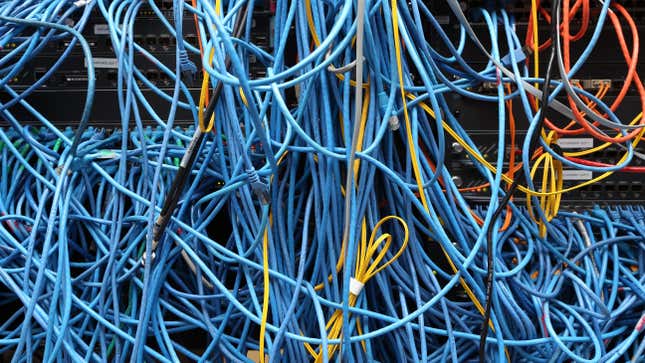
The last time the Federal Communications Commission updated its definition for broadband internet, Mad Men was still airing new episodes on TV. The agency’s minimum broadband speeds—25 megabits per second for downloading and 3 megabits per second for uploading—simply aren’t enough bandwidth in 2021 to meet the needs of many small businesses, which is why one government watchdog says it’s calling for regulators to revise these standards.
In a report released Thursday, the U.S. Government Accountability Office said that “much of the literature” it’s reviewed indicates that the FCC’s current minimum benchmark speeds “are likely too slow to meet many small business speed needs.” It reached this conclusion after speaking with several small business owners nationwide and analyzing statistics from the U.S. Census Bureau and the FCC’s own broadband deployment data.
A concerning number told the GAO they aren’t even getting the minimum speeds currently required by the FCC. A Vermont inn and spa owner said she pays $78 a month for a 10 Mbps download speed, and she’d have to shell out $335 a month to upgrade to a plan with a 40 Mbps download speed. And just because you have access to broadband internet doesn’t necessarily mean that access is reliable. One small business owner who works out of her home in rural Virginia said that every time it rains, she can expect her broadband service to go down. Another in Iowa said he has to pay more than $350 every month for two satellite accounts and a wireless hot spot to get service reliable enough to operate his business.
Reports from small businesses show that many want a download speed of at least 100 Mbps to run their operations more effectively. According to the FCC’s data, about 67 percent of rural Americans have access to 100 Mbps down/10 Mbps up speeds, compared to about 83 percent with access to the agency’s current minimum benchmark.
“FCC officials said they are not aware of any small business requirements that have been taken into consideration in determining the minimum speed benchmark,” the GAO writes. “Analyzing small business speed requirements could help inform FCC’s determination of the benchmark speed for broadband.”
According to Thursday’s report, the FCC has agreed with its recommendation to solicit stakeholder input and analyze small business broadband speed needs in order to re-evaluate the federal minimum benchmark speeds.
While the GAO’s recommendation focuses specifically on small businesses, consumers would also likely see positive impacts from the FCC modernizing its definition of broadband internet access. Those living in internet deserts would benefit from faster connections and more reliable service, improving both their experience streaming and downloading media in their downtime as well as their ability to work from home at a time when more companies than ever before are transitioning to remote-first strategies in response to the covid-19 pandemic.